Each year, influenza affects an estimated one billion people worldwide, with 3 to 5 million cases resulting in severe illness and between 290,000 and 650,000 deaths due to respiratory complications (World Health Organization, 2023)1.
Influenza is primarily classified into four types (A, B, C, and D). Among them, some influenza A viruses are highly contagious and cause acute respiratory illness, spreading rapidly through populations, particularly during seasonal outbreaks2.
Therefore, understanding the scale, transmission dynamics, and subtypes of influenza A is essential, as it is the only type of influenza virus known to cause global pandemics. This article will explore the influenza A symptoms in adults as well as children, setting the stage for further discussion on its diagnosis, treatment, and prevention strategies.
Influenza type A is caused by the influenza A virus, which is a single-stranded RNA virus. It infects the cells lining the respiratory tract and triggers an immune response that leads to the flu2.
Influenza A viruses are classified into subtypes based on the combination of their proteins (hemagglutinin [HA] and neuraminidase [NA]). Currently, the two main influenza A subtypes circulating in humans are A(H1N1) and A(H3N2)1,2.
Influenza A is highly contagious. This virus primarily spreads through respiratory droplets released during coughing, sneezing, or talking, and can also be transmitted by touching surfaces that already have been exposed to the virus. One of the key reasons influenza A is so widespread and potentially severe is its ability to undergo frequent genetic changes3:
Influenza A typically presents with a sudden onset of symptoms, often making individuals feel acutely unwell within a short period. The most common influenza A symptoms in adults and children include4:
In addition to these respiratory symptoms, gastrointestinal symptoms such as nausea, vomiting, and diarrhoea may also occur, especially in children, though they are not always present4.
Note: Although often confused with the common cold, influenza (flu) is generally more severe and comes on more suddenly5. Therefore, accurate diagnosis is important for proper management.
Certain groups of people are more likely to develop serious complications from influenza A. These include:
The initial diagnosis of influenza A usually begins with a clinical evaluation, where doctors assess the patient’s symptoms and medical history7.
To confirm influenza A, the following diagnostic tests may be used:
Note: If you test influenza A positive, it means the virus has been detected in your body, and you may need rest, supportive care, or antiviral medications depending on symptom severity.
Most healthy people with mild flu symptoms recover with rest, fluids, and fever-reducing medicines. However, treatment may be necessary if influenza A symptoms in adults (and children) worsen or do not improve.
Note: They are usually not needed for mild cases in healthy people7. However, patients with mild cases in high-risk group (e.g., elderly, pregnant, chronic illness) may warrant antivirals.
Note: Aspirin should be avoided in children due to the risk of Reye’s syndrome9. It’s ideal to consult a doctor before.
Being influenza A positive indicates an active infection that can be contagious, so isolation and proper hygiene are important to prevent spreading the virus to others. Here are effective ways to protect yourself and others:
While most people recover from influenza type A within a few days to two weeks, it’s important to seek medical care if symptoms worsen or new complications arise. You should see a doctor as soon as possible if you experience10:
Note: If you observe that your symptoms improve for a while but then return with fever and worse cough, it may indicate a secondary bacterial infection. Therefore, it is very important to contact a doctor in such cases.
High-risk individuals should be especially vigilant and contact a doctor early. Complications to watch for in influenza type A include3:
Also Read: What is Influenza (Flu) & Its Types
Understanding and effectively managing influenza A is vital to reducing its impact on individuals and communities. While many cases are mild, the flu can lead to serious complications, especially in high-risk groups. Therefore, timely diagnosis, appropriate treatment, and preventive measures like vaccination, hand hygiene, and staying home when sick can help avoid the spread of the virus significantly.
Additionally, raising awareness about symptoms, risk factors, and when to seek medical help empowers people to take proactive steps, ensures better health outcomes, and avoids severe illness or death from flu-related complications.
Also Read: H1N1 (Swine Flu): Causes, Symptoms, Treatment, and Prevention
Flu symptoms tend to be more sudden and severe than cold symptoms. For example, symptoms such as fever, body aches, and severe fatigue are typically more pronounced in the flu compared to the common cold5.
Yes. There are different subtypes (like H1N1, H3N2), and your immunity to one doesn’t protect you from others if you are infected with one subtype. That’s why yearly vaccination is important2.
Most people are contagious from a day before symptoms appear to about 5 to 7 days after becoming sick2. Children and those with weakened immune systems may be contagious longer.
Only influenza A viruses are known to cause pandemics due to their ability to undergo significant genetic changes and infect multiple species2.
Disclaimer: The information provided here is for educational/awareness purposes only and is not intended to be a substitute for medical treatment by a healthcare professional and should not be relied upon to diagnose or treat any medical condition. The reader should consult a registered medical practitioner to determine the appropriateness of the information and before consuming any medication. PharmEasy does not provide any guarantee or warranty (express or implied) regarding the accuracy, adequacy, completeness, legality, reliability or usefulness of the information; and disclaims any liability arising thereof.
Influenza, commonly called the flu, is an infectious disease that can lead to mild to severe illness, sometimes resulting in hospitalisation or even death1.
Influenza is caused by highly contagious viruses and can lead to seasonal outbreaks worldwide1. According to the National Centre for Disease Control, India recorded 76,030 cases and 2,172 deaths (2019 to April 2025) from Seasonal Influenza A, with significant outbreaks in 2019 and 20242.
This article explores what influenza is, its types, its transmission, diagnosis, treatment, and prevention.
Influenza is a common respiratory infection caused by influenza viruses that include types A, B, C, and D, however, types A and B are primarily responsible for seasonal epidemics in humans. These viruses infect both the upper and lower parts of the respiratory system and primarily spread through respiratory droplets when an infected person coughs, sneezes, or talks, but can also be transmitted via surfaces that have already been contaminated3.
While healthy individuals usually recover within a few days, influenza can lead to serious complications (such as pneumonia and even death) in high-risk groups like young children, the elderly, pregnant women, and those with weakened immune systems1,3.
Note: People with the flu are usually contagious 1 day before symptoms appear and remain so for 5 to 7 days after.
Influenza (flu) and the common cold are respiratory infections caused by different viruses, with the flu typically producing more severe symptoms than the common cold. Let’s see the difference:
There are four types of influenza viruses that affect humans to varying degrees:
This type of influenza causes pandemics and epidemics:
This type of influenza causes seasonal outbreaks:
This causes mild respiratory illness:
This does not infect humans (currently):
Here’s a quick comparison table to help you understand the key differences between the four types of influenza viruses3,7,9.
Types of Influenza
| Feature | Influenza A | Influenza B | Influenza C | Influenza D |
| Hosts | Humans, birds, pigs, and other animals | Humans only | Humans (rarely pigs) | Cattle and pigs |
| Pandemic Potential | Yes | No | No | No |
| Epidemics | Yes (major seasonal outbreaks) | Yes (seasonal, less severe) | Rarely | No |
| Symptoms | Moderate to severe | Mild to Severe | Mild | Not applicable to humans |
| Examples | H1N1, H3N2 | Victoria, Yamagata lineages | Sporadic mild illness | Not linked to human cases |
You may be wondering is influenza infectious?
Yes, influenza is highly infectious. The virus mainly spreads through respiratory droplets expelled when an infected person coughs, sneezes, or talks. These droplets can land in the mouths or noses of nearby people or be inhaled into their lungs. Additionally, the virus can be transmitted by touching surfaces or objects contaminated with it, and then touching the face (particularly the nose, mouth, or eyes)3,5. Influenza can also spread through tiny airborne particles that linger longer and travel farther, especially indoors.
Each type of influenza virus (A, B, C, and D) spreads differently:
Certain groups of people are at an increased risk of developing severe influenza complications. Key high-risk groups include:
The diagnosis of influenza usually starts with a clinical assessment based on observable symptoms such as fever, cough, body aches, and fatigue. For confirmation, your doctor may use various diagnostic methods to detect influenza viruses. These may include:
Note: Nasal swabs or suction samples from the nose are the best for accurate flu testing.
Influenza often resolves itself without medical intervention3. However, treatment options are important for those at higher risk of complications or severe illness.
Note: You should only take this medication if your doctor has prescribed it for your condition.
Note: Do not give aspirin to children as it has been associated with the risk of Reye’s Syndrome15.
If your fever has been gone for at least 24 hours without using fever-reducing medicine and you feel better, it’s a sign of recovery. Isolation should continue for at least 24 hours after the fever ends to help prevent the spreading of the flu13.
Prevention strategies are essential to reduce flu transmission and protect public health:
While many cases of influenza resolve within a week, the virus can sometimes lead to serious complications, especially in vulnerable populations. Common influenza complications include:
Other rare complications occurring only in severe cases include:
Early medical care can help avoid serious complications. Seek medical attention immediately if you experience16:
The introduction of influenza as a major public health concern highlights the need for effective prevention and treatment strategies. It is a potentially serious illness that spreads easily and can lead to severe complications if not managed properly. Therefore, recognising symptoms early, seeking timely medical care, and taking preventive measures are key to reducing its impact. While early antiviral treatment (under medical advice) can help reduce the risk of severe outcomes, annual vaccination remains the most effective way to protect against seasonal flu.
India usually sees two flu peaks: a major one during the post-monsoon season (August to October) due to high humidity and rainfall, and a smaller winter peak (January to March), mainly affecting northern regions17.
The influenza virus constantly changes its surface proteins (hemagglutinin and neuraminidase) through antigenic drift, so immunity from a previous year’s vaccine may not protect well against new strains. Hence, annual vaccination is needed9.
No. You should stay at home until at least 24 hours after your symptoms/fever subsides without medication to avoid infecting others13.
While rare, some animals (like pigs, ferrets, and cats) can contract certain flu viruses. However, transmission from pets to humans is extremely uncommon18.
Disclaimer: The information provided here is for educational/awareness purposes only and is not intended to be a substitute for medical treatment by a healthcare professional and should not be relied upon to diagnose or treat any medical condition. The reader should consult a registered medical practitioner to determine the appropriateness of the information and before consuming any medication. PharmEasy does not provide any guarantee or warranty (express or implied) regarding the accuracy, adequacy, completeness, legality, reliability or usefulness of the information; and disclaims any liability arising thereof.
Type 2 diabetes mellitus (T2DM) is a chronic condition that can progressively worsen without effective management1.
Mounjaro is a recent and advanced management option available for adults with T2DM. It is officially approved as an adjunct to diet and exercise to improve blood sugar control in adults with T2DM1,2. Besides this, it has also attracted attention due to its effect on weight management in obese individuals3.
In this article, we will provide a clear and balanced overview of Mounjaro and its role in the evolving landscape of diabetes care.
Many people ask, “Is Mounjaro a semaglutide?”
Well, the answer is “No”. Although Mounjaro is used for a similar purpose, it is not a semaglutide. Mounjaro is actually the brand name for tirzepatide (generic name), which is a drug approved by the U.S. Food and Drug Administration (FDA) in 2022 for managing type 2 diabetes mellitus (T2DM). While both help in lowering blood sugar levels, semaglutide works by activating the glucagon-like peptide-1 (GLP-1) receptor, Mounjaro uniquely stimulates both the GLP-1 receptor and the glucose-dependent insulinotropic polypeptide (GIP) receptor, providing a dual mechanism of action4.
Mounjaro was originally developed to help control the blood sugar levels in adults. However, it has also shown potential in supporting weight management, which has led to its growing use for obesity management as well4.
Mounjaro (tirzepatide) is an FDA-approved medication, currently used as a second-line therapy for management of T2DM along with lifestyle and diet changes4.
In addition to managing blood sugar levels, tirzepatide has shown to be effective in reducing body weight, backing its use for obesity management as well3.
Clinical trials, such as the SURPASS studies, have demonstrated that tirzepatide leads to greater reductions in glycated haemoglobin (HbA1c) (up to -2.34%) and weight management (up to 11.2 kg) than many existing options, including other GLP-1 receptor agonists like semaglutide5,6.
Mounjaro contains tirzepatide, a synthetic polypeptide and the first dual receptor agonist of its kind, acting on both the4:
While GLP-1 receptor agonists like semaglutide stimulate insulin release and suppress appetite, tirzepatide’s added action on the GIP receptor enhances insulin sensitivity, further improving blood sugar control and supporting weight management6.
Functionally, tirzepatide:
Knowing the right Mounjaro dosage and how to use it is key to getting the best results in managing T2DM as well as body weight. A low Mounjaro dose is given as a subcutaneous injection to start with, in order to help your body adjust and is then increased gradually for better blood sugar control and weight management4.
Here’s a simple Mounjaro dosage chart2,4:
| Dose Stage | Strength | Frequency | Duration |
| Starting Dose | 2.5 mg / 0.5 mL | Once a week | First 4 weeks |
| Maintenance Dose 1 | 5 mg / 0.5 mL | Once a week | After 4 weeks |
If blood sugar levels need to be controlled further, the dose can be increased by 2.5mg after 4 weeks on the current dose till a maximum dose of 15 mg/ 0.5 mL. However, it requires an expert in the field, like an Endocrinologist, to monitor you regularly while you initiate the treatment and continue the treatment.
If you’re wondering how to use Mounjaro, the injection process is straightforward and can be done in just a few steps. However, it’s important to follow your doctor’s instructions closely and use it only under medical supervision. While there is no specific best time of day to take Mounjaro, it should be administered on the same day each week2.
If you miss a dose of Mounjaro, contact your doctor and take the dose within 4 days (96 hours). If more than 4 days have passed, skip the missed dose and consult your doctor before resuming your next scheduled injection4. Avoid taking two doses at once to compensate for a missed dose. If you suspect an overdose or have serious concerns, seek urgent medical help immediately.
Note: Do not self-medicate; only a doctor can help you determine the best schedule based on your treatment plan.
Globally, Mounjaro is supplied in various vials and devices. It may be available as a single dose vial, as a single-dose prefilled pen, or a multidose prefilled pen device in various strengths2.
Following the guidelines below on how to store Mounjaro will help maintain its effectiveness and safety.
Storage Instructions:
Expiration & Disposal:
Mounjaro is generally well-tolerated, and most users do not experience severe side effects. However, like all medications, it may cause adverse effects in some individuals, especially during the initial weeks of use. Let us answer some common doubts.
The most commonly reported side effects of Mounjaro include nausea, vomiting, diarrhoea, constipation, indigestion, decreased appetite, and pain at the injection site2,4.
Though rare, serious side effects of Mounjaro may include vision changes, inflammation of the pancreas (pancreatitis), severe allergic reactions such as swelling of the face or lips and difficulty breathing, kidney issues, gallbladder problems, gastrointestinal complications, and thyroid tumours (including C-cell tumours)2,4.
Most Mounjaro side effects are temporary and last for few days to few weeks after starting treatment, usually until the body adjusts to it. Always speak with your doctor if side effects persist or worsen.
Note: Mounjaro’s long-term side effects are still being studied, but current data suggest monitoring for potential risks such as thyroid tumours, pancreatitis, and kidney problems.
Yes, constipation is a known side effect of Mounjaro and may occur early in the course of treatment4. Consult your doctor if it becomes severe.
Some patients may experience headaches with Mounjaro as a result of low blood sugar2. If these are persistent, consult your doctor.
Fatigue or tiredness is not a widely reported side effect, but dizziness, light-headedness or confusion may occur in some users, especially when experiencing low blood sugar2. If fatigue continues, consult your doctor.
As per my experience of seeing a few patients who have been prescribed Mounjaro in the last 2 months – I have seen most of them face gastric issues like nausea, bloating and constipation or diarrhoea initially. While we have medicines to manage most of these symptoms, it’s important to start the dietary guidance in tandem when you begin the injections and keep the dietician and doctor in the loop together.
Dr. Malavika Athavale, Consulting Clinical and IBS Nutritionist
Before starting, it’s important to review and understand Mounjaro’s precautions. These may include certain groups of people who should not take Mounjaro, such as:
Before starting Mounjaro:
While Mounjaro generally has a low risk of food interactions, it’s important to understand how it may interact with certain foods, drinks, and medications.
Foods and drinks to avoid include:
Medications to use with caution include:
Note: Discussing all the medications you take allows your doctor to personalise your treatment and avoid any potential Mounjaro interactions.
Also Read: Mounjaro vs Zepbound: Differences, Uses, Side Effects & More
When you stop taking Mounjaro, its effects on blood sugar and weight gradually wear off. Blood glucose levels may begin to rise again, and weight that was lost during treatment might return over time (especially if lifestyle habits aren’t maintained)8.
Therefore, always speak with your doctor before stopping Mounjaro so they can adjust your diabetes or weight management plan accordingly and help you transition safely to another therapy if needed.
Mounjaro is an innovative treatment for T2DM that offers dual action on GLP-1 and GIP receptors, leading to effective blood sugar control and weight management benefits. While generally well tolerated, it may cause side effects like nausea, constipation, or, more rarely, pancreatitis or thyroid-related issues.
Proper usage, including consistent weekly dosing and safe injection practices, is key to achieving the best outcomes. Also, be sure to consult your doctor before beginning or discontinuing Mounjaro. They will assess your health history, monitor potential interactions, and tailor the treatment to your individual needs to ensure safety and effectiveness.
Also Read: Mounjaro vs Ozempic: Our Endocrinologist Explains the Difference
Mounjaro begins to improve blood sugar levels within the first few weeks (around 4 weeks) of treatment, depending on the dose and individual response2.
Mounjaro has a long half-life of approximately 5 days. It stays in your system for about 30 days after your last dose, although its effects begin to wear off sooner9.
Yes, constipation, nausea, and headaches are among the commonly reported side effects of Mounjaro2. Contact your doctor if they do not resolve on their own in a few days.
If you miss a dose, contact your doctor and get the dose administered within 4 days. If more than 4 days have passed, skip the missed dose and resume your regular schedule after consulting your doctor2. Never double the dose to make up for a missed one. Always consult your doctor for guidance.
Stopping Mounjaro may lead to a rise in blood sugar levels and possible weight regain9. Always discuss discontinuation with your doctor to explore alternative treatments or gradual transitions.
No. While both Mounjaro and semaglutide are GLP-1 receptor agonists, Mounjaro is a dual GIP and GLP-1 receptor agonist, which may provide added benefits in blood sugar control4.
There is no direct interaction, but limiting alcohol is advised, as it can affect blood sugar levels and increase the risk of dehydration or gastrointestinal side effects10. Always check with your doctor about alcohol use.
Disclaimer: The information provided here is for educational/awareness purposes only and is not intended to be a substitute for medical treatment by a healthcare professional and should not be relied upon to diagnose or treat any medical condition. The reader should consult a registered medical practitioner to determine the appropriateness of the information and before consuming any medication. PharmEasy does not provide any guarantee or warranty (express or implied) regarding the accuracy, adequacy, completeness, legality, reliability or usefulness of the information; and disclaims any liability arising thereof.
Punarnava is an indigenous plant with numerous medicinal properties. Punarnava derives its name from its nature of growth and proliferation. The aerial part of the plant dries up in the summer and regenerate in the rainy season; Its name, Punarnava, comes from the Sanskrit words ‘Punar’ meaning “again” and ‘Nava’ meaning “new,” symbolising the plant’s ability to renew and restore itself1.
Punarnava is called Hogweed in English, and the botanical name of the plant is Boerhavia diffusa2.
This plant has many different names in India, such as:
Based on my experience, I have observed that the ethyl acetate extract from the roots of punarnava may have strong antifungal properties. It has shown the ability to inhibit the growth of fungal species such as Microsporum gypseum, M. fulvum, and M. canis. The extract hinders the growth and reproduction of these fungi, suggesting its potential use as an effective antifungal8.
Dr. Siddharth Gupta, B.A.M.S, M.D (Ayu)
Punarnava has been in use in Ayurveda since ancient times. All parts of the plant are utilised in the preparation of various formulations, owing to their wide range of medicinal properties.
Punarnava may be beneficial in managing symptoms of rheumatism and gout.
In my experience, I have observed that Punarnava may possess notable spasmolytic properties, meaning it can help relax muscles by reducing their contractions. This effect is believed to be linked to its influence on calcium regulation within the muscles, as well as the presence of active compounds such as boeravinone E8.
Dr. Smita Barode, BAMS
Also Read: Arjunarishta: Uses, Benefits, Side Effects & More!
The Punarnava plant and its parts are traditionally used in different forms to prepare remedies for a range of health conditions, as outlined below:
Your Ayurvedic physician will determine the appropriate form and dosage based on your individual health condition.
Although no side effects have been reported so far. It is important to note that these herbal remedies are generally prescribed as part of a treatment regimen, where one preparation may help to balance the effects of another. It is important to use such remedies only under the supervision of a qualified practitioner.
Over the years, based on my experience and observations, I believe that Punarnava may have notable anticonvulsant properties. Some studies8 have shown its potential in helping to reduce seizures. This effect is thought to be linked to a compound in the plant known as liriodendron, which may work by blocking calcium activity in the brain.
Dr. Rajeev Singh, BAMS
Punarnava may interact with the following medications:
Also Read: Tamarind (Imli): Uses, Benefits, Side Effects and More!
Punarnava has been traditionally valued for its wide range of supportive health benefits. However, it should be used responsibly and under medical supervision. Always consult a qualified doctor before starting any herbal treatment.
Punarnava may help to effectively manage obesity by reducing appetite. It may also detoxify the body and prevent fluid retention, which may help in weight loss.
Glaucoma is a condition characterised by increased pressure within the eye, which can sometimes be associated with diabetes. Punarnava, known for its blood sugar-lowering properties, may help support overall glucose management. Traditionally, the root of Punarnava when ground on a stone and applied carefully to the eyes over several days, is believed to provide soothing relief for certain eye conditions.
The Punarnava plant may be helpful in kidney disorders like irregular blood pressure and diuresis. The plant extract is commonly used as a diuretic to help flush the kidneys. Both the powdered form and aqueous decoction of the extract are traditionally used to support the management of nephrotic syndrome.
The root of the plant is powdered and mixed with mamira (Thalictrum foliosum) to help soothe the symptoms of eye disorders like corneal ulcers and night blindness. The leaves of the plant may be used to make ophthalmic lotions for various eye disorders.
Yes, Punarnava may be beneficial to reduce fluid accumulation in the abdomen. It also helps to reduce the symptoms of ascites caused due to liver diseases.
Punarnava is known to be beneficial for the kidneys. It may help support the function of nephrons damaged by diabetes and act as an effective diuretic, promoting increased filtration. This process can assist in flushing out excess fluids and toxins from the body.
1. Bihari Dora B, Dora BB, Gupta S, Sital S, Pastore A. Punarnava (Boerhavia diffusa): A Promising Indigenous Herbal Drug and Its Effect on Different Disease Conditions. 2015 [cited 2022 Feb 15];21–4. Available from: https://sciencejournals.stmjournals.in/index.php/RRJoHS/article/view/715
2. Abbi C, Kumar V, Kumar S, Kumar D. Punarnava (Boerhavia diffusa): A promising indigenous herbal drug. Int Res J Pharm. 2013;4(3):85–89. Available from: https://www.researchgate.net/publication/269846433_PUNARNAVA_BOERHAVIA_DIFFUSA_A_PROMISING_INDIGENOUS_HERBAL_DRUG
3. Umamaheswari A, Nuni A, Shreevidya R. Evaluation of antibacterial activity of Boerhaavia diffusa L. leaves. Int J Green Pharm. 2010;4(2):88–92. Available from: https://www.researchgate.net/publication/44298779_Evaluation_of_antibacterial_activity_of_Boerhaavia_diffusa_L_leaves
4. Rao PP. Ophthalmic uses of Boerhaavia diffusa L. (Punarnava): Review. J Med Plants Stud. 2016;4(2):78–80.Available from: https://www.researchgate.net/publication/335381955_Ophthalmic_uses_of_Boerhaavia_Diffusa_L_Punarnava_Review
5. Rajendran K, Raj C D, Ramakrishnan V, Krishnan UM. Therapeutic efficacy of Punarnavadi mandura against phenylhydrazine-induced hemolytic anemia in rats. J Tradit Complement Med. 2025;15(1):93–104. Available from: https://www.sciencedirect.com/science/article/pii/S2225411024000361
6. Patil GG, Shettar RV. Evaluation of the efficacy of Punarnavadi Guggulu & Mahamashadi Taila Kati Basti in the management of Gridhrasi (Sciatica). J Ayurveda Integr Med Sci. 2019;4(2):15–23. Available from: https://jaims.in/jaims/article/view/588
7. Shah VN, Shah MB, Bhatt PA. Hepatoprotective activity of punarnavashtak kwath, an Ayurvedic formulation, against CCl₄-induced hepatotoxicity in rats and on the HepG2 cell line. Pharm Biol. 2011;49(4):408–15. doi:10.3109/13880209.2010.521162. PMID: 21391842. Available from: https://pubmed.ncbi.nlm.nih.gov/21391842/
8. Mishra S, Aeri V, Gaur PK, Jachak SM. Phytochemical, therapeutic, and ethnopharmacological overview for a traditionally important herb: Boerhavia diffusa Linn. Biomed Res Int. 2014;2014:808302. doi:10.1155/2014/808302. Epub 2014 May 14. PMID: 24949473; PMCID: PMC4053255. Available from: https://pmc.ncbi.nlm.nih.gov/articles/PMC4053255/
Disclaimer: The information provided here is for educational/awareness purposes only and is not intended to be a substitute for medical treatment by a healthcare professional and should not be relied upon to diagnose or treat any medical condition. The reader should consult a registered medical practitioner to determine the appropriateness of the information and before consuming any medication. PharmEasy does not provide any guarantee or warranty (express or implied) regarding the accuracy, adequacy, completeness, legality, reliability or usefulness of the information; and disclaims any liability arising thereof.
Human papillomavirus (HPV) is one of the most common sexually transmitted infections (STIs) prevalent globally. This virus primarily affects the skin and mucous membranes of the genital area, mouth, and throat, causing asymptomatic infections or growths called as warts. While most HPV infections resolve on their own without medical intervention, persistent infection with certain high-risk strains can lead to serious health issues, including certain cancers such as cervical, oropharyngeal (tonsils, base of tongue), anal, and penile cancers1,2.
In India, HPV-related cancers pose a significant public health challenge. Projections for 2025 estimate approximately 121,302 new HPV-related cancer cases, accounting for 7.7% of the total cancer burden in the country (3.3% among males and 12.0% among females).3 Therefore, understanding the causes, symptoms, and prevention methods for HPV infections is crucial for reducing the risk of diseases caused by this virus and promoting public health. In this article, we will discuss what is HPV, and why is it something we should all be aware of!
HPV belongs to a group of small, non-enveloped, double-stranded DNA viruses known as papillomaviruses. It mainly infects the basal cells of the skin or mucous membranes, usually entering through tiny cuts or tears on the surface3.
Once inside the basal layer of the skin (stratified squamous epithelium), the virus begins its life cycle. As the infected skin cells mature and move toward the surface, HPV replicates along with them.
In some cases (especially with high-risk types like HPV 16 and 18) the virus can interfere with normal cell functions. These high-risk types may integrate with the DNA of host cells, leading to the continuous production of proteins that block the body’s natural control over cell growth. Over time, this uncontrolled cell growth can lead to cancer, such as cervical cancer.
On the other hand, low-risk HPV types (like types 6 and 11) are not linked to cancer occurrence, though they can cause conditions like genital warts3.
Scientists have made major progress in understanding HPV, especially through genetic research, but there is still more to learn about how the virus behaves and changes over time4.
There are over 200 types of HPV viruses, and they are classified based on where they infect and the level of risk they pose. These types are broadly divided into:
These infect the skin rather than the mucosal (tissue lining of organs) areas5,6,7:
These infect the mucosal (tissue lining of organs) areas and are classified into two types:
Low-risk HPV types: These conditions are non-cancerous but can be recurrent or obstructive and may require ongoing medical treatment:5,6,7
High-risk HPV types: These types can cause pre-cancerous changes and cancers, especially5,6,7:
The HPV virus is mainly spread when a healthy person comes in direct contact with an infected person. Common human papillomavirus causes/modes of transmission include:
In most cases, human papillomavirus infection causes no symptoms and goes unnoticed, especially in the early stages. However, in some cases, HPV symptoms may appear due to warts or long-term complications of persistent infection:
Note: Vaginal or anal bleeding may occur in advanced cervical/anal disease; however, this is not an early or direct symptom of HPV itself.
HPV can lead to several serious health complications, particularly when caused by high-risk strains of the virus. While many human papillomavirus infections are asymptomatic and clear on their own, persistent infections can result in the following complications:
Since human papillomavirus infections are often asymptomatic, routine screening and specific diagnostic tests are essential, especially for women. While there is no general screening test for HPV in men, several tests can help identify HPV-related complications in both sexes. Common methods of HPV diagnosis include:
There is currently no cure for human papillomavirus infection itself, but various treatment options are available for HPV-related conditions, including genital warts and HPV-associated cancers.
Warts caused by HPV can be managed using various methods, depending on their location, size, and the patient’s immune response. However, it’s important to note that there is no antiviral cure to eliminate the HPV virus itself. Most HPV infections are cleared naturally by the immune system within 1 to 2 years. Treatment focuses on removing visible warts and relieving symptoms, not eradicating the virus. Common treatment options include2,4:
If HPV infection progresses to cancer (such as cervical, anal, vulvar, penile, or mouth cancer), management involves2:
Note: HPV-positive cancers, especially oropharyngeal cancers, generally have a better prognosis and may respond differently to therapy, which can influence treatment planning.
While HPV is a quite common virus, several steps can significantly reduce the risk of infection and its complications. These measures include:
The HPV vaccine is the most effective way to avoid infection from the most harmful types of HPV virus, including those that cause genital warts and cancer. It is ideally given before the onset of sexual activity, typically recommended for children aged 9 to 14, with a 2-dose schedule. Older individuals (aged 27 to 45) may also benefit from vaccination based on risk factors and in consultation with their doctor11.
Using condoms and protection during vaginal, anal, and oral sex also helps to reduce the risk of HPV transmission1. Additionally, limiting the number of sexual partners can also decrease the risk of exposure.
Routine cervical cancer screening is recommended for women aged 21 to 65 years. This includes a Pap test every 3 years, or for women aged 30 and above, a combination of Pap test plus HPV co-testing every 5 years12. These screenings help detect early abnormal cell changes caused by HPV, allowing for timely intervention and prevention of cervical cancer.
Increasing awareness about HPV transmission, symptoms, and prevention methods helps reduce stigma and encourages initiative-taking healthcare. Parents should also be informed about the benefits of HPV vaccination for their children.
Although many HPV infections clear on their own without causing symptoms, it’s important to seek medical attention if you:
Human papillomavirus causes an cause warts and serious cancers, but most infections have no symptoms and clear on their own. Therefore, understanding what HPV is, what are the common HPV symptoms, and how to protect yourself through vaccination, testing, and awareness, are key to preserving long-term health and reducing the risk of serious complications.
Vaccines protect against the high-risk cancer-causing types (like HPV 16 and 18) and some low-risk types that cause warts (like 6 and 11), but they do not treat existing infections. Additionally, regular testing helps detect early changes caused by HPV for timely treatment. Together, vaccination, testing, and awareness are key to reducing HPV-related health problems and protecting public health.
Also Read: HPV Vaccine: What is It, When to Be Taken, Importance & Side Effects
It can take several years, often 15 to 20 years, for a persistent HPV infection to develop into cancer1.
Several factors can increase the risk of HPV infection, including early age at first sexual intercourse, having multiple sexual partners, smoking, long-term use of oral contraceptives (over 5 years), chewing betel nut, and exposure to radiation or ultraviolet (UV) light4.
There is no cure for the virus itself, but most infections clear naturally. Treatments are available for warts and precancerous changes2.
HPV is unique because many infections cause no symptoms and clear on their own, but some types can lead to cancer, unlike many other STIs1.
Disclaimer: The information provided here is for educational/awareness purposes only and is not intended to be a substitute for medical treatment by a healthcare professional and should not be relied upon to diagnose or treat any medical condition. The reader should consult a registered medical practitioner to determine the appropriateness of the information and before consuming any medication. PharmEasy does not provide any guarantee or warranty (express or implied) regarding the accuracy, adequacy, completeness, legality, reliability or usefulness of the information; and disclaims any liability arising thereof.
Non-alcoholic fatty liver disease (NAFLD) is often referred to simply as fatty liver. It is one of the most common liver conditions affecting people worldwide1. This condition involves the buildup of excess fat in the liver that is not caused by the consumption of alcohol2.
In India, adult NAFLD rates have been reported as high as 38.6% in adults and 35.4% in children, and the prevalence is known to increase with age and lifestyle related health issues3. Fatty liver can range in severity from simple fat accumulation (non-alcoholic fatty liver or NAFL) to a more serious form called non-alcoholic steatohepatitis (NASH), which can lead to liver fibrosis, cirrhosis, or even liver cancer if left unaddressed1.
The good news is that regular physical activity is one of the most effective ways to manage fatty liver1,3. In this article, we will explore the causes and symptoms of fatty liver and highlight the most effective exercises you can incorporate into your routine to support liver health and manage this condition. Keep in mind that choosing the best exercise for fatty liver means focusing on activities that improve cardiovascular health as well as promote weight loss.
Fatty liver develops when there is an abnormal buildup of fat in liver cells, more than 5% of the liver’s weight2,5. This fat accumulation occurs due to various conditions:
Beyond this, several other conditions and factors can contribute to NAFLD:
Most people with fatty liver disease (especially in the early stages) may not experience any symptoms1. However, as the condition progresses, some people might start to notice signs that something isn’t quite right.
Below, we have mentioned some common symptoms of a fatty liver:
It’s important to note that these symptoms are not exclusive to fatty liver disease and may be associated with other health conditions. However, as the condition progresses to NASH and cirrhosis, signs like abdominal/leg swelling, itchy skin, and spider-like veins may appear9. That’s why regular health check-ups are crucial, especially if you have risk factors like obesity, diabetes, or high cholesterol.
If you’re concerned about your liver health, you can get a simple test, such as Liver Function Test (LFT), to check how well your liver is working. This blood test measures levels of liver enzymes and can help detect early signs of liver problems.
One of the most effective ways to improve fatty liver disease is through regular exercise. Are you wondering what the best exercise for fatty liver is? The answer lies in a combination of aerobic activities like walking and strength training for lasting benefits. Studies have shown that both aerobic (cardio) and resistance (strength) training have been proven to reduce fat in the liver10,11.
Here are some simple and effective exercises for fatty liver that you can include in your daily routine:




Note: While exercise and yoga offer certain benefits for fatty liver, it is important to perform activities within your comfort level and under the guidance of fitness and yoga professionals. Additionally, if you have any underlying health conditions, it is important to take medical clearance with the medical practitioner before pursuing any exercise regime.
Yoga is a powerful tool that not only reduces stress but also helps stimulate internal organs like the liver, enhancing detoxification and improving its function16. Hence, it can be particularly beneficial for individuals with fatty liver disease. Here are some asanas that you can try out:
Steps17:


Steps19:
Duration and Frequency18:

Steps19:
Duration and Frequency:
Benefits19:

Steps17:
Duration and Frequency:
Benefits17:

Steps17:
Duration and Frequency:
Benefits17:
Note: Always practice yoga for fatty liver with awareness and within your comfort level. If you have any underlying health conditions, recent surgeries, or are pregnant, consult your doctor before starting20. It’s best to learn and perform yoga under the guidance of a certified yoga instructor to ensure proper technique and safety. Ideally, practice yoga in the early morning or at a time when your stomach is empty for better results and comfort17.
In addition to medical guidance and structured treatment, individuals with fatty liver disease can adopt several practical lifestyle measures to support liver health:
Also Read: Exercises for Hernia. Dos and Don’ts
Fatty liver disease often develops silently, but timely medical consultation is advised when you notice the above-mentioned symptoms to rule out this condition. If the disease progresses, it becomes crucial to seek immediate medical attention. You must visit the doctor if you experience any of the following, as these may indicate that the liver disease has advanced:
As NAFLD progresses, it may develop into non-alcoholic steatohepatitis (NASH), a more severe form that includes inflammation and liver cell damage. If left unmanaged, NASH can progress to fibrosis, cirrhosis, or liver cancer2. Therefore, regular medical check-ups and early lifestyle interventions such as exercise for fatty liver are key to managing fatty liver disease and avoiding long-term complications.
Also Read: Safe Stretching Exercises You Can Try If Suffering From Phimosis
Exercise and yoga play a vital role in managing fatty liver disease by promoting weight loss, enhancing insulin sensitivity, reducing liver fat, and improving overall metabolic health. While there is no single best exercise for fatty liver approved solely for NAFLD, consistent physical activity, combined with mindful practices like yoga, can significantly halt the progression of the disease.
By adopting a healthier lifestyle that includes regular exercise, a balanced diet, stress reduction, and mindful habits such as yoga, individuals can not only manage fatty liver more effectively but also improve their overall well-being. Regular consultation with a doctor with early intervention and sustained lifestyle changes is key to avoiding complications and leading a healthier, more energetic life.
Exercise is an important aspect of managing fatty liver disease that can significantly help reduce liver fat. However, it works best when combined with a healthy diet and lifestyle changes20.
No, moderate-intensity exercise is sufficient for most people to improve liver health11. Vigorous or high-intensity exercise can help, but it is not mandatory and should be done only if comfortable and safe.
Always start at your own pace and avoid pushing yourself too hard. If you experience pain, dizziness, or difficulty breathing during exercise, you should stop immediately and consult a doctor. Individuals with existing health conditions should always seek medical advice before starting any new exercise or yoga regimen.
Disclaimer: The information provided here is for educational/awareness purposes only and is not intended to be a substitute for medical treatment by a healthcare professional and should not be relied upon to diagnose or treat any medical condition. The reader should consult a registered medical practitioner to determine the appropriateness of the information and before consuming any medication. PharmEasy does not provide any guarantee or warranty (express or implied) regarding the accuracy, adequacy, completeness, legality, reliability or usefulness of the information; and disclaims any liability arising thereof.
Dolo 650 tablets relieve pain, fever, headaches, toothaches, migraines, and body aches. They contain paracetamol, which blocks chemicals causing pain and fever1. Side effects are rare but may include temporary stomach discomfort, nausea, or vomiting. If side effects persist or worsen, consult a doctor.
Dolo 650 dosage and duration may vary depending on the condition and symptoms. While Dolo 650 can be taken with or without food, it is generally recommended to take it with food to avoid stomach upset. Do not take more than four tablets in 24 hours, and avoid giving them to children under 12. Stop taking the medication once the fever and pain subside. Do not take it if you are allergic to paracetamol or any components of Dolo 650.
Consult a doctor before using it for an extended period. Other medicines such as Crocin 650mg Advance, Lanol Er 650mg, P 650mg, and Dolopar 650mg also contain paracetamol as their active ingredient.
Dolo 650 tablets relieve pain and fever1. It is used to treat headaches, muscle aches, toothaches, and fevers. Dolo 650 also helps with pain and inflammation from conditions like arthritis, spondylitis, and sports injuries.
Chances of developing side effects with the Dolo 650 are rare if taken within the recommended doses. However, in rare cases, you may experience:
Can I take the Dolo 650 tablet during pregnancy?
Yes, Dolo 650 can be used during pregnancy if recommended by the doctor2. However, it should be used for a short duration in low doses and should not be used too frequently by pregnant women.
Can I take the Dolo 650 tablet while breastfeeding?
Yes, Dolo 650 can be taken during breastfeeding as paracetamol passes into the breastmilk in minimal quantities, which has negligible effects on a child3.
Can I drive if I have consumed the Dolo 650 tablet?
Yes, the Dolo 650 tablet is unlikely to impair your ability to drive or operate machinery.
Can I consume alcohol with the Dolo 650 tablet?
Avoid consuming alcohol with Dolo 650 as it contains paracetamol which can be critical when combined with alcohol. It can also cause liver damage4. Use caution if you have kidney disease.
Talk to your doctor if
Take the Dolo 650 tablet as a whole with a glass of water or as directed by your doctor. Do not consume more than that recommended by your doctor.
Symptoms of an overdose of Dolo 650 includes nausea, vomiting, loss of appetite and stomach ache. If you happen to take too much of the Dolo 650 tablet, reach out to your doctor or the nearest hospital immediately.
If you have missed a dose of the Dolo 650 tablet, then take it as soon as you remember. Keep a gap of at least 4-6 hours between this dose and the next dose. If it is almost time for the next dose, then skip the missed dose and continue with your regular dosing schedule.
Dolo 650 tablets work by interfering with the production of a chemical called prostaglandins, which are responsible for fever, swelling, and the sensation of pain5. It also acts on the part of the brain that controls body temperature.
As with any medication, Dolo 650 must be taken exactly as prescribed. Daily intake should not exceed 4000 mg. The most common side effects at high doses are liver damage and severe epidermal necrosis. If you have liver or kidney disease, heart problems, or stomach ulcers, exercise extreme caution.
Yes, Dolo 650 tablets can be used for headaches. However, if you are feeling you get the headache too often and there is not much relief in the headache after taking this medicine, consult your doctor.
You can take Dolo 650 tablet for controlling fever, it may not have any action in reducing cold as colds usually happen due to a viral infection.
Dolo 650 and Crocin are paracetamol-based medications that relieve pain and reduce fever. A healthcare professional’s advice on the best medication is recommended based on the condition and severity of pain.
Yes, the Dolo 650 tablet can be used to relieve body pain. Be sure to consult your doctor if your body ache is persistent and does not go away in a few days.
No, the Dolo 650 contains a high dose of paracetamol and it should not be used for kids below 12 years of age.
You can take Dolo 650 regularly for many days as advised by the doctor, but don’t take more than the recommended dose. Because overdosing on paracetamol can cause serious side effects.
Yes, paracetamol 650 and Dolo 650 are essentially the same, as both contain 650 mg of paracetamol as the active ingredient. The difference lies in the branding, with Dolo 650 being a specific brand name for the 650 mg paracetamol tablet. Both are used to relieve pain and reduce fever.
Yes, Dolo 650 is the most commonly prescribed medicine for fever control and pain relief.
Dolo 650 and Hifenac D are both pain relievers, but they have different active ingredients and mechanisms of action. Always take the medicine prescribed by your doctor, as the same will be based on your condition and medical history.
Disclaimer: The information provided here is for educational/awareness purposes only and is not intended to be a substitute for medical treatment by a healthcare professional and should not be relied upon to diagnose or treat any medical condition. The reader should consult a registered medical practitioner to determine the appropriateness of the information and before consuming any medication. PharmEasy does not provide any guarantee or warranty (express or implied) regarding the accuracy, adequacy, completeness, legality, reliability or usefulness of the information; and disclaims any liability arising thereof.
Have you been feeling unusually tired, low on energy, mentally unclear or confused? While these symptoms can have many causes, one possibility worth considering is a deficiency in vitamin B12.
Vitamin B12, also known as cobalamin, is an essential nutrient involved in red blood cell production, nerve function, and DNA synthesis. While it is often overlooked, adequate B12 level is essential for maintaining energy levels and supporting cognitive and neurological health of the body.
Your body cannot produce B12 on its own, so it must be obtained through foods high in vitamin B12 or supplements. Animal-based foods such as meat, dairy, and eggs are the primary sources of vitamin B12. Thus, if you follow a vegetarian or vegan diet, you may need B12 supplements to meet your daily requirement for the vitamin1,2.
In this article, we will explore vitamin B12 rich foods to help you maintain optimal vitamin B12 level and support your overall health, in a way that is both enjoyable and practical.
Vitamin B12 (also called cobalamin) is a nutrient your body needs to stay healthy2. It plays a key role in:
The recommended dietary allowance (RDA) of vitamin B12, which is sufficient for the nutrient needs of adults, is approximately 2.4 mcg per day2.
Individuals following a vegan or vegetarian diet are at increased risk of having low vitamin B12 levels, as B12 is mostly found in animal foods.
People with health conditions that interfere with vitamin B12 absorption also may be at risk of deficiency, even if they consume enough through food. Since vitamin B12 absorption is a complex, multi-step process, any disruption can affect how much the body absorbs.
You are more likely to have low B12 if you3:
Good to know: Unlike foods high in vitamin B12, B12 from supplements or fortified foods (like some cereals or plant-based milks) does not need to go through all these steps. It is already in a form your body can absorb more easily. Therefore, these alternate options could be helpful for people who have trouble absorbing B12 from food.
Signs of a vitamin B12 deficiency can appear slowly and may include3:
If these sound familiar, talk to your doctor about testing for vitamin B12 levels.
Vitamin B12 plays a key role in keeping your energy levels up, your nerves healthy, and your blood cells functioning properly2. Since your body cannot make it on its own, getting enough from foods high in vitamin B12 (or supplements) is essential.
Most vitamin B12 comes from animal-based foods, but there are some excellent fortified plant-based options for vegetarians and vegans2,3. Let’s explore some of the top vitamin B12 rich foods to help you meet your daily needs and stay energised and healthy:
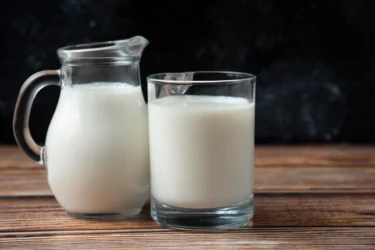
Milk is an easy and reliable source of B12. It also gives you calcium and vitamin D, which help build strong bones and support your immune system1.
Tip: For vegans, fortified plant-based options like soy milk can offer up to 45% of your B12 RDA. Check the label to be sure.

Yoghurt is not just good for your gut; it is a solid B12 source1.
Tip: Choose low-fat, unsweetened yoghurt to avoid added sugar while still getting protein, calcium, and gut-friendly probiotics.
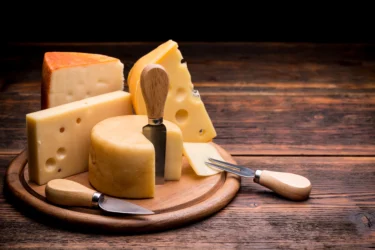
Cheese adds flavour and nutrients to your meals2.
Note: Cheese is nutritious but also high in saturated fat; therefore, enjoy it in moderation.

Eggs are packed with high-quality protein, healthy fats, and B vitamins1.
Tip: Include eggs a few times a week as a simple, nutrient-rich choice.

Fish is one of the richest natural sources of vitamin B12. It also provides omega-3 fats for heart and brain health1.
Here is how much B12 you get from these portions:
Bonus: A serving of salmon also gives you around 40g of protein, which is great for muscle health.

Poultry is a lean and healthy protein source that also provides B121.
Bonus: It is great for those who prefer lean meats.

Shellfish are B12 superfoods as they provide high levels of vitamin B122.
Bonus: Even small portions of these superfoods provide way more than your daily need and they are also rich in zinc and iron!
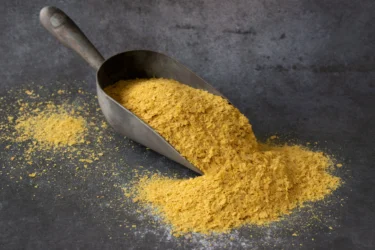
A favourite among vegans, nutritional yeast has a cheesy flavour and is often fortified with B121.
Bonus: Great served on popcorn, in soups, or stirred into sauces. Always check the label to make sure it is fortified.
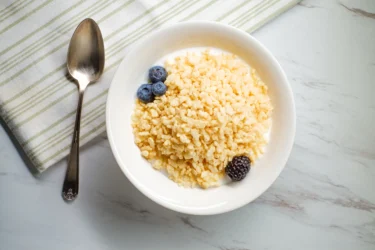
Fortified cereals have vitamin B12 added during processing, making them easy to absorb for vegetarians and vegans1.
Tip: Pair with fortified plant milk for a double B12 boost. Check the nutrition label for specifics.
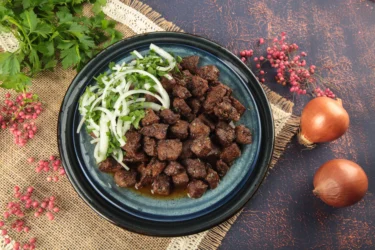
Beef is a powerful source of B12, especially organ meats like liver2.
Caution: Although liver is a great vitamin-rich option for those who eat it, make sure you cook it in healthy oils.
Most people can get enough vitamin B12 from vitamin B12 food sources, especially if they eat animal-based foods like meat, dairy, or eggs. But for some groups, it can be harder to absorb or get enough from food alone. In these cases, a vitamin B12 supplement can be very helpful, and sometimes even necessary.
Here are some groups who may benefit from B12 supplementation3:
Since B12 is found mainly in animal products, people on plant-based diets may not get enough from food alone. A daily B12 supplement or fortified foods can help fill the gap.
As we age, our stomach produces less acid, which can affect how well we absorb B12 from food. Many older adults benefit from B12 in supplement form, which is easier to absorb.
Conditions like Crohn’s disease, celiac disease, or those who have had intestinal or stomach surgery (including weight-loss surgery) can make it harder to absorb B12 properly. Supplements, sometimes in higher doses or by injection, may be needed for these individuals.
This is an autoimmune condition that prevents the body from absorbing B12 naturally. If you have this, your doctor may recommend regular B12 shots or high-dose supplements to keep your levels up.
GI tract surgery, such as a gastric bypass, can reduce your body’s ability to absorb vitamin B12, increasing the risk of deficiency.
Medications like metformin or acid blockers can impair the body’s ability to absorb B12 properly, therefore, individuals who take such medicines may need vitamin B12 supplementation.
Symptoms like fatigue, memory issues, dizziness, numbness or tingling in the hands and feet, and pale skin can indicate a vitamin B12 deficiency. If you have these symptoms, you should visit a doctor.
Your doctor will ask about your symptoms and may also check your reflexes, balance, and sensation since B12 affects the nerves. To confirm whether you are deficient, your doctor will order some blood tests. These help catch problems early, guide treatment, and prevent serious complications like anaemia and nerve damage.
Also Read: How To Increase Platelet Count Naturally
Also Read: 11 Healthy Foods That Can Help You to Gain Weight
Sometimes, if the cause of B12 deficiency is unclear, your doctor might recommend further testing:
Testing and treating vitamin B12 deficiency is simple, but crucial. Left untreated, low B12 levels can lead to permanent nerve damage, anaemia, and memory issues. If you are experiencing symptoms or are in a higher-risk group (like older adults, vegans, or people with gut issues) it is important to get checked.
Also Read: 10 Iron Rich Foods to Add to Your Diet
Making sure you get enough vitamin B12 from vitamin B12 food sources is an important part of staying healthy. This is because it supports your energy levels, nervous system, and red blood cell production.
Vitamin B12 deficiency often develops slowly, and sometimes the symptoms can be easily overlooked, like fatigue, brain fog, or tingling in the hands and feet. For most people, eating a well-balanced diet that includes animal-based foods like dairy, eggs, fish, or meat is enough to maintain healthy B12 levels. However, if you are vegetarian, vegan, over the age of 50 years, or have a digestive condition that affects nutrient absorption, a quick blood test can give you peace of mind and help you stay ahead of any health issues.
Taking small steps now, like including vitamin B12-rich foods in your diet, can make a significant difference in your long-term energy, memory, and well-being.
Since vitamin B12 is found naturally in animal-based foods (like meat, fish, dairy, and eggs), vegetarians and especially vegans may struggle to get enough from food alone. However, there are some great alternatives, such as fortified foods (like cereals, nutritional yeast, and plant-based milks). Vegans, in particular, should consider taking B12 supplements after consulting with a doctor to ensure they are getting enough to maintain healthy levels.
The recommended dietary allowance (RDA) for adults is about 2.4 micrograms (mcg) per day. However, this can vary slightly based on age, pregnancy, and health conditions. If you are unsure about your specific needs, it is always best to consult with a healthcare provider.
A vitamin B12 deficiency can lead to a variety of symptoms, including fatigue, weakness, memory problems, and nerve damage. Over time, not getting enough B12 can lead to anaemia (low red blood cells), and in more serious cases, it can cause neurological problems like difficulty walking, numbness, or even memory loss. It is essential to get enough B12 either from your diet or supplements (if recommended) to avoid these issues.
Vitamin B12 is a water-soluble vitamin, which means that any extra amount your body does not need is usually excreted in urine. Because of this, it is generally considered safe to take more than the recommended daily amount. However, high doses of B12, especially through supplements, should be discussed with your doctor, particularly if you have any underlying health conditions.
Yes, cooking can affect the vitamin B12 content in food. High temperatures and prolonged cooking times can break down some of the B12 in foods. To minimise loss, try using gentler cooking methods like steaming or poaching instead of frying or grilling at very high temperatures.
Physician’s comment:
“While cooking can reduce the B12 content in foods, it is usually not enough to cause a deficiency on its own (unless your diet already lacks B12-rich foods). If you are worried about this, focusing on a variety of vitamin B12 sources, including fortified foods and supplements, if necessary, will help ensure adequate intake.”
Disclaimer: The information provided here is for educational/awareness purposes only and is not intended to be a substitute for medical treatment by a healthcare professional and should not be relied upon to diagnose or treat any medical condition. The reader should consult a registered medical practitioner to determine the appropriateness of the information and before consuming any medication. PharmEasy does not provide any guarantee or warranty (express or implied) regarding the accuracy, adequacy, completeness, legality, reliability or usefulness of the information; and disclaims any liability arising thereof.
We’ve all been there…feeling sick but not sure what to do next. You might be too unwell to leave your bed, stuck in work meetings, or it’s a weekend, and your doctor isn’t available. So what do most of us do?
We start browsing our symptoms on the internet and somehow always end up convinced it’s the worst possible thing. Then comes step two, asking mom, or dadi, maybe even trying a couple of nuskhas just in case, and eventually delaying getting actual help.
And let’s be honest, neither option helps. By now, you’re left feeling confused, anxious, and still unwell. Moreover, finding the right specialist nearby, waiting for an appointment, and waiting in long queues feels like a lot when you’re already not feeling your best.
But should health really be a waiting game?
That’s why we’re proud to introduce ‘Doctor Consult’ — where you can connect with highly experienced and qualified Doctors anytime, anywhere from the comfort of your home. Whether you need expert advice urgently or just want to check in on your health, help is now just a tap away.
Our mission is to make healthcare not only easier and more affordable but also truly patient-first. From trusted medicines to lab tests and now, online Doctor consultation — we’re bringing the complete healthcare experience right to your fingertips.
Healthcare shouldn’t be a waiting game.
These pain points create a gap between people and timely medical attention. And in that gap, we saw an opportunity to make a real difference.
No more wondering whether it’s the “right time” to consult. Whether it’s a 2 AM fever or a midday migraine, help is just a few taps away.
We understand that recovery is a journey. That’s why we offer a free follow-up call within 7 days of your consultation, so your Doctor can check in on your progress and adjust treatment if needed.
From dermatology and gynaecology to cardiology and psychotherapy, Doctor Consult connects you with experts whenever you need one. Whatever your concern, there’s a specialist ready to help.
Comfort matters. Choose between audio or video consultations based on what works best for you. If needed, your doctor might request a video chat if it helps with diagnosis.
Your conversations with the Doctor are private and secure, so you can talk openly without any worry.
Starting at just ₹199* get expert medical advice while also saving on your travel costs and waiting time.
Once your online Doctor consultation is over, your prescription is uploaded and saved on the PharmEasy app. This allows you to easily order your medicines in one go and have them delivered to your doorstep.
Worried about your loved ones? You can use your account to book consultations for them as well.
So whether it’s a small concern or a big question, whether you’re at home, at work, or on the go: your Doctor is now just a tap away.
Here’s how to consult a Doctor online with PharmEasy:
Based on your slot, you’ll be connected to a qualified Doctor without stepping outside your home.

At PharmEasy, we believe healthcare should be simple, accessible, and tailored to your needs. That’s why we’re combining the power of medicines, diagnostics and now online Doctor consultation to provide a holistic approach to your well-being.
By offering a wide range of specialities, secure consultations, and affordable prices, we are transforming the way you receive healthcare. Let’s continue to make healthcare accessible, convenient, and hassle-free, together.
Try Doctor Consult today and experience an easy way to take charge of your health. Because when it comes to your well-being, we believe timely care shouldn’t have to wait.
Book Your Online Doctor Consultation
Disclaimer: The information provided here is for educational/awareness purposes only and is not intended to be a substitute for medical treatment by a healthcare professional and should not be relied upon to diagnose or treat any medical condition. The reader should consult a registered medical practitioner to determine the appropriateness of the information and before consuming any medication. PharmEasy does not provide any guarantee or warranty (express or implied) regarding the accuracy, adequacy, completeness, legality, reliability or usefulness of the information; and disclaims any liability arising thereof.
Vitamin D, often called the “sunshine vitamin,” is produced by your body when your skin is exposed to sunlight. It is also found in certain foods, such as fish, eggs, soy products, and fortified dairy, as well as in supplements containing vitamin D. Vitamin D helps your body absorb calcium, which is essential for strong bones. But that’s not all, it also supports the immune system, helps keep muscles strong, may reduce inflammation, and may be associated with a lower risk of chronic conditions like heart disease, diabetes, and arthritis.
Vitamin D deficiency in women can lead to various health issues including bone fractures, muscle weakness, tiredness, and hair loss, and may also lead to changes in the sleep pattern. Globally, around 1 billion people have insufficient vitamin D levels, and over 40% of women of childbearing age are affected1. Vitamin D deficiency in women is observed across all age groups, from infants and adolescent girls to pregnant and breastfeeding mothers, as well as older women.1
In this article, we’ll explore how much vitamin D per day for women is needed, why it is important, vitamin D deficiency symptoms in women, and tips to increase your vitamin D levels through diet, sunlight exposure, supplements, and lifestyle habits.
Vitamin D for women is essential for their overall well-being. It plays a key role in many body functions throughout the different stages of life, from adolescence to pregnancy and menopause, as it1,3:
While our bodies can make vitamin D on their own when exposed to sunlight, several factors such as staying indoors, frequent use of sunscreen, having a darker skin tone, or living in places with limited sunlight can affect how much is produced. That’s why getting vitamin D through your diet or supplements is often necessary.
Vitamin D is a fat-soluble vitamin, meaning it’s stored in your body fat and liver and released as needed. However, its levels can decline over time without regular intake, so a steady intake of the vitamin is necessary to maintain healthy levels.
Your daily vitamin needs can vary based on your age and specific health needs. For example, older adults need more vitamin D to prevent bone loss, while pregnant and breastfeeding women require increased intake, depending on individual needs and their baseline levels, to support both their health and their baby’s development1,2.
The Recommended Dietary Allowance (RDA) of a nutrient is the average daily intake that meets the needs of most healthy individuals. Taking the right amount of the vitamin helps support strong bones, proper muscle function, and immunity without allowing your vitamin D levels to drop too low or rise too high2.
Here’s a simple guide to the RDA of vitamin D for different age groups and needs:
Many women do not realise that they are at risk of vitamin D deficiency as it can develop gradually and for a myriad of reasons. Here are some causes of deficiency of vitamin D in women:
By being aware of the causes of vitamin D deficiency, we can make informed choices about our lifestyle and diet to ensure our bodies get enough vitamin D.
Vitamin D is essential for overall well-being, and a deficiency in this vital nutrient can lead to a variety of symptoms, many of which may be unnoticed initially. Vitamin D deficiency symptoms in women can range from mild, subtle symptoms to more serious ones over time, as follows:
If you notice any of these symptoms, consult a healthcare provider immediately.
You should consider getting tested for vitamin D deficiency if you often feel tired, have weak muscles, or have aches in your bones or joints. You should also get tested if you’re pregnant, breastfeeding, or over the age of 50 years since your body needs higher levels during these stages of life6. Laboratory tests that can be used for diagnosing vitamin D deficiency in women include:
Optimal vitamin D levels are essential for overall good health, promoting strong bones, and supporting vital body functions throughout life. Here are some key health benefits of healthy vitamin D levels in women:
If you’re looking to prevent vitamin D deficiency by increasing your vitamin D levels, incorporate these practices into your daily routine to help you maintain optimal levels:

Step outside for 10–30 minutes a few times a week between 10 a.m. and 4 p.m. and let your face, hands, arms, and legs soak in the sunlight without applying sunscreen2.

Add vitamin D-rich foods like fatty fish (salmon and tuna), egg yolks, fortified milk or cereal, mushrooms exposed to sunlight, and cod liver oil to your diet2.
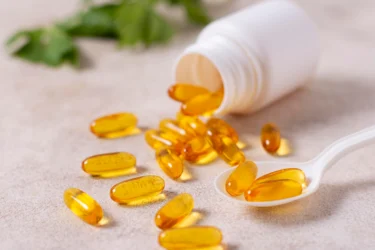
If you’re not getting enough vitamin D from food or sunlight, consider taking vitamin D2 or D3 supplements. Vitamin D3 is generally preferred over D2 for better absorption and efficacy. Consult with your doctor before you begin any supplements2.

Regular outdoor activities like walking can help your body produce vitamin D naturally9,10.
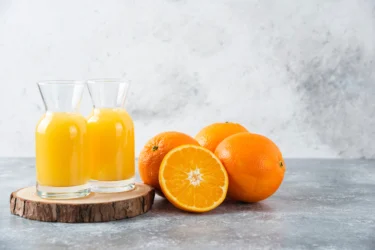
Look for foods fortified with vitamin D, for example, vitamin D–fortified orange juice, yoghurts, or breakfast cereals2.

If you are concerned about low vitamin D levels, talk to a healthcare provider for personalised recommendations or a vitamin D test2.
While vitamin D deficiency often doesn’t cause noticeable symptoms, there are some signs that may indicate a deficiency. If you experience any of the following symptoms, you may need to consult a healthcare professional to determine whether you have a vitamin D deficiency:
Vitamin D plays an important role in women’s health. Right from infancy to post-menopause, it’s essential for supporting strong bones, muscles, and immunity, and may even support mental health. Although vitamin D deficiency is common across all age groups and can lead to issues like tiredness, bone pain, and a higher risk of chronic diseases, it is manageable. Getting regular sun exposure, eating a balanced diet, and taking supplements when needed can help you steer clear of the potential issues associated with vitamin D deficiency. Since symptoms of vitamin D deficiency may often be silent, it’s better to get tested regularly if advised by your doctor or if you are at risk of deficiency, especially during pregnancy, breastfeeding, and after the age of 50 years. Take charge of your sunshine vitamin intake and ensure good health and overall well-being.
Also Read: Can You Increase Your Breast Size Naturally? Here’s What Doctors Want You To Know
Yes, one can bring their vitamin D levels back to normal with vitamin-rich foods, supplements, and lifestyle changes6.
If left untreated for a long time, vitamin D deficiency can affect many body functions, primarily causing weak bones, bone pain, frequent fractures, and making you more prone to infections6.
No, vitamin D supplements alone won’t help you lose weight. However, maintaining a healthy weight may help improve your vitamin D levels naturally2.
Yes, however, vitamin D toxicity is extremely uncommon. It usually occurs only when someone takes very high doses for a long time. A vitamin D level above 150 nmol/L is considered toxic11.
The upper limit of vitamin D that is considered safe is 4,000 IU/day. Taking more than this regularly can increase the risk of side effects associated with vitamin D toxicity11.
Disclaimer: The information provided here is for educational/awareness purposes only and is not intended to be a substitute for medical treatment by a healthcare professional and should not be relied upon to diagnose or treat any medical condition. The reader should consult a registered medical practitioner to determine the appropriateness of the information and before consuming any medication. PharmEasy does not provide any guarantee or warranty (express or implied) regarding the accuracy, adequacy, completeness, legality, reliability or usefulness of the information; and disclaims any liability arising thereof.
Next Page »« Previous Page